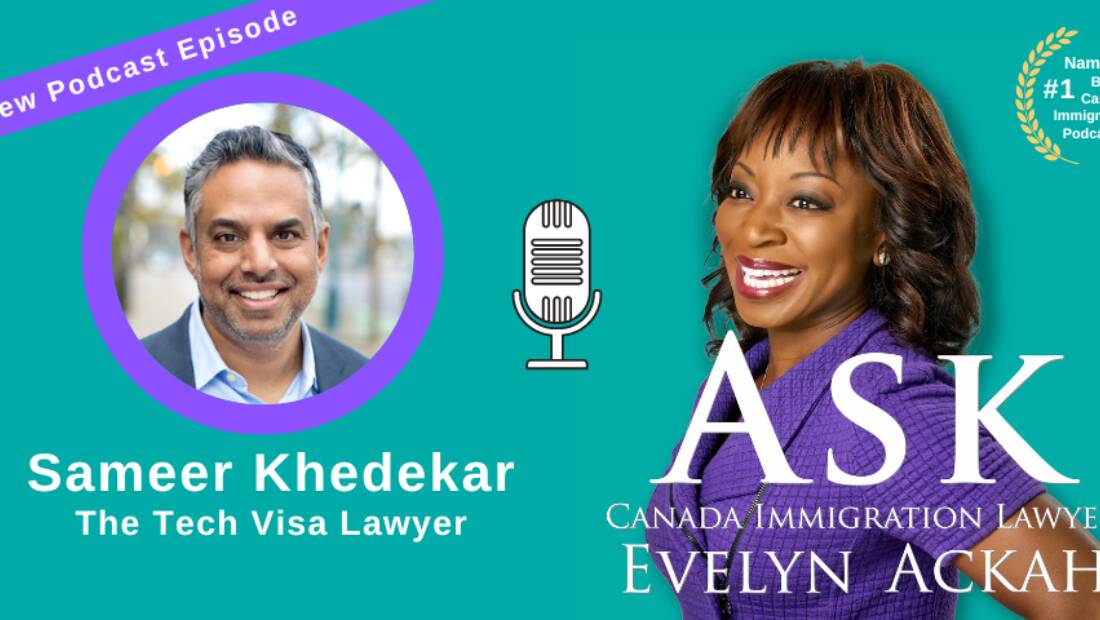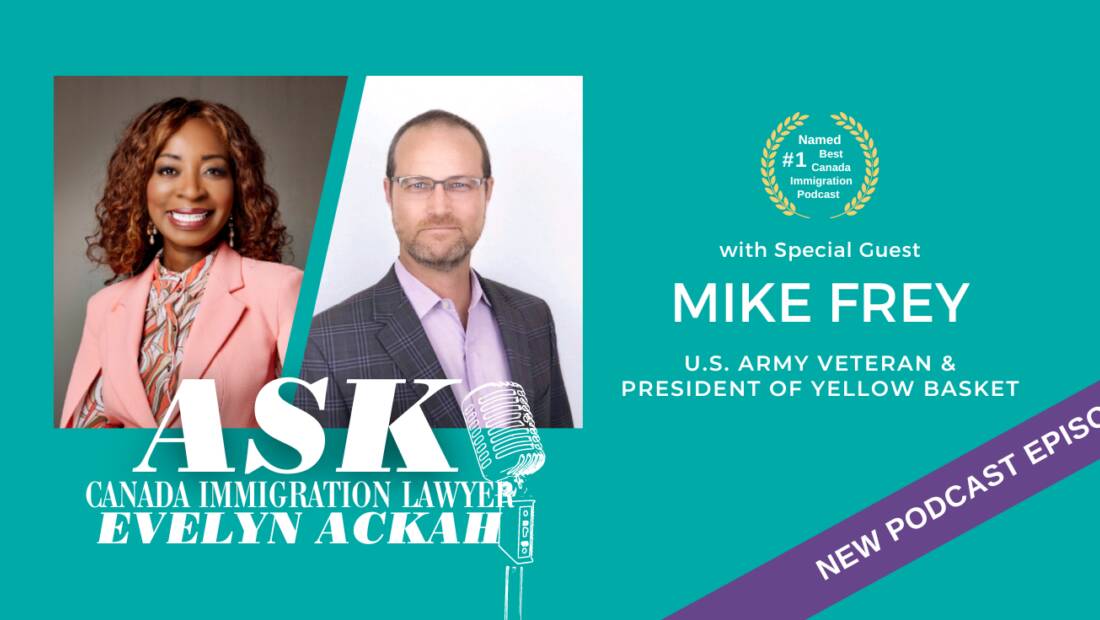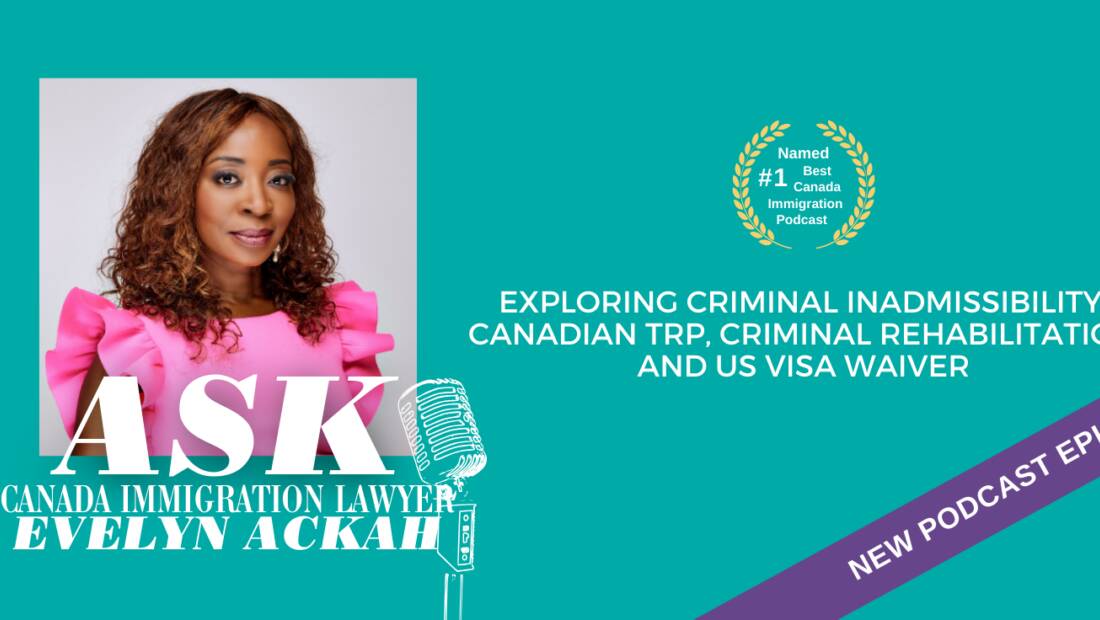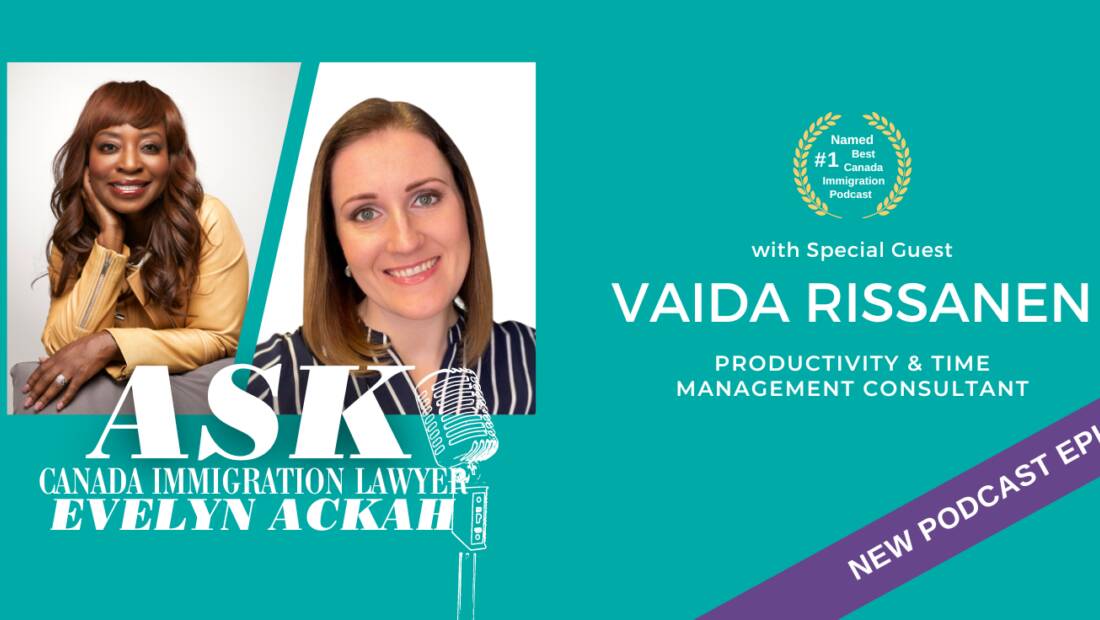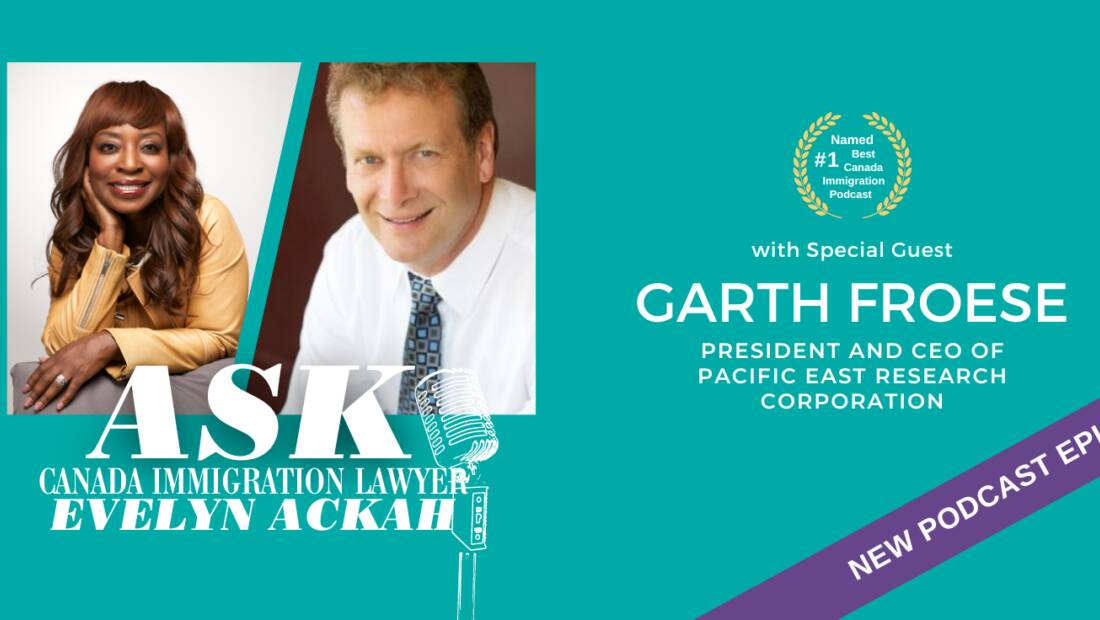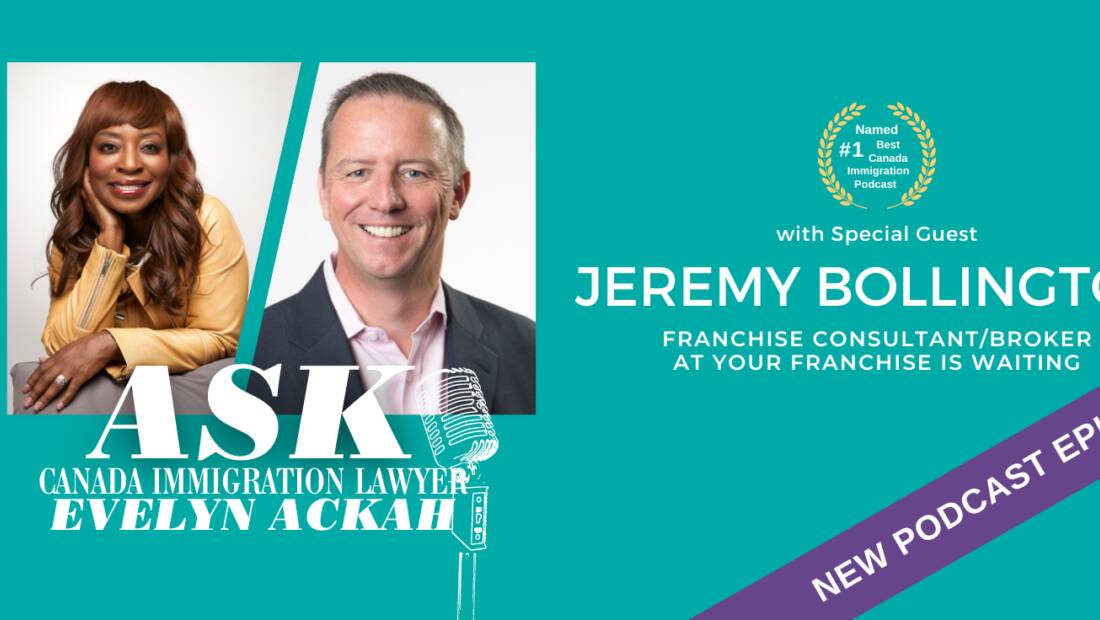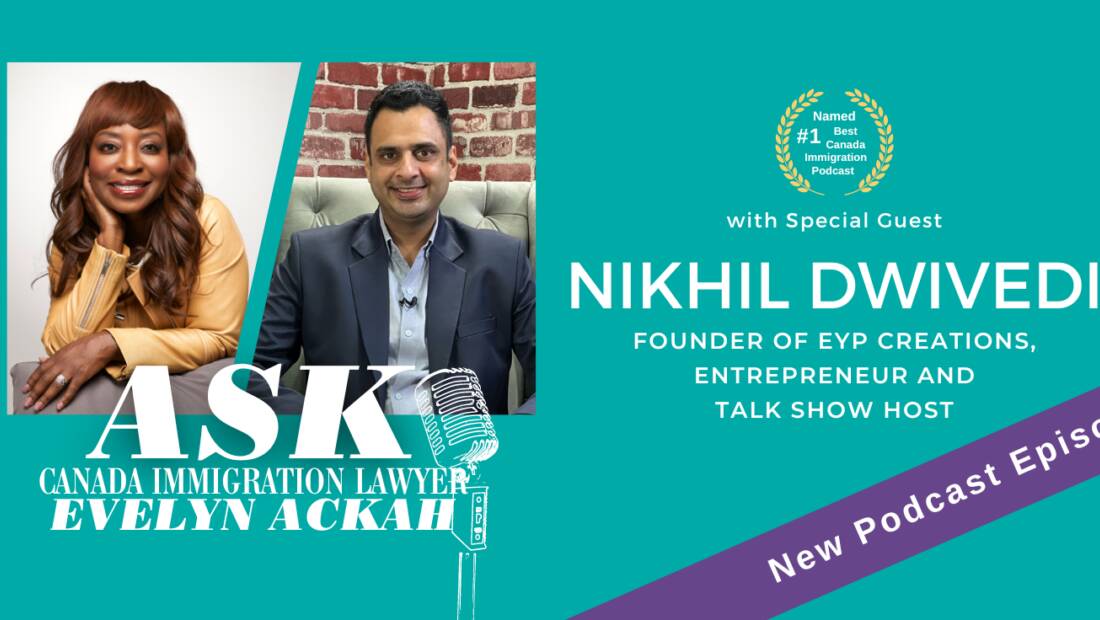Or listen on your favourite podcast app
BOOK YOUR FREE CASE EVALUATION
Calgary immigration lawyer Evelyn Ackah speaks with U.S. immigration lawyer Sameer Khedekar, the Founder and Managing Attorney at Banyan Law in California. Sameer was named one of the top 20 immigration attorneys in the nation by HR Executive, was just selected for inclusion into the Lawdragon 500 Leading Corporate Employment Lawyers Guide, joining only 70 other corporate immigration lawyers nationwide. Sameer is listed in Chambers USA and the International Who's Who of Corporate Immigration Lawyers. He is one of only a handful of immigration lawyers to be certified as an immigration expert by the State Bar of California. Sameer is the co-author of Unshackled.
Follow Sameer on Social Media
LinkedIn: linkedin.com/in/sameer-a-khedekar/
TikTok: @techvisalawyer
Evelyn and Sameer discuss
- How Sameer's birthname and dealing with bureaucrats led to his interest in immigration law
- Why he waited so long to become a U.S. citizen, then chose to practice business immigration
- Business immigration is personal to Sammer: Because Sameer is Indian and lives in Silicon Valley, and his typical client is an Indian in tech who needs a green card
- The U.S. green card quota and backlog versus the Canadian visa system
- H-1B visas versus EB-1A visa wait times
- Challenges and options for individuals laid off H-1B holders
- U.S. State Department plan's pilot for domestic visa renewal

About Evelyn Ackah
Evelyn Ackah is the Founder and Managing Lawyer at Ackah Business Immigration Law. We work with individuals and business owners from all over the world who want to cross borders seamlessly. For more information on immigration to Canada or the United States, Ask Evelyn Ackah at Ackah Business Immigration Law today at (403) 452‑9515 or email Evelyn directly at contact@ackahlaw.com.
The Ask Canada Immigration Lawyer Evelyn Ackah podcast by Calgary Immigration Lawyer Evelyn Ackah was named #1 Best Canada Immigration Podcast in 2022 by Feedspot.
BOOK YOUR FREE CASE EVALUATION
Transcript:
Evelyn Ackah:
Good day everyone. Thank you so much for joining the Ask Canada Immigration Lawyer podcast. I'm Evelyn Ackah and I have the real pleasure today of welcoming my friend and colleague, Sameer Khedekar. He is the founder and managing lawyer of Banyan Law, based in California, where he focuses on US immigration law and especially focused on startups, Fortune 500 companies and what else do you do? You do everything...
Sameer Khedekar:
Investors, founders.
Evelyn Ackah:
Founders, all investors, so lots of things to talk about. Welcome, Sameer.
Sameer Khedekar:
Thank you. Thanks so much for having me.
Evelyn Ackah:
Well, I wanted to have you on our podcast because you do a kind of immigration law, obviously, that I don't do as a US attorney. Really focused on Silicon Valley and that whole industry. Can you tell me how you got into this field, different from just a general immigration lawyer?
Sameer Khedekar:
Oh my gosh.
Evelyn Ackah:
You don't have to go all the way back to the beginning of your life but...
Sameer Khedekar:
But actually the beginning of my life does inform how I started immigration.
Evelyn Ackah:
Tell me.
Sameer Khedekar:
Well, this is what I tell people. So my mom actually, since she was living, and my dad, my mom and dad were living in LA, after they got married and before I was born, my mom got pregnant. She went back to India to have me, which is the opposite of what everyone was trying to do back then. So my mom's kind of quirky, quirky mom, but she was also feeling super alone and she wanted her support system out there.
And so I was born in India and I had a green card for when I came back. I had a green card, a permanent residency for 30 years, and the government kept messing up my name on my green card. So when I was 13 or 14, I'd have to go stand in line and try to convince them to fix it, which is something they should've done but I feel like I had to convince them.
And that was my first exposure to working with bureaucrats and trying to convince them to do a job they're supposed to do and I realized I was pretty good at it, I liked it. I saw a bunch of people around me as a kid who seemed like they just needed a lot of help and it just planted the seed and fast-forward to law school. I had no idea what I wanted to do. I graduated law school without a job and I fell into work at a small immigration firm in San Francisco. That's where I learned business immigration and that's kind of how it started.
Evelyn Ackah:
That's so cool. That's so cool. I can't believe that poor kid having to stand in line, get your name corrected. Why did you wait so long? I mean, this is obviously off topic, but to become a citizen?
Sameer Khedekar:
Well, that's a great question. I'm kind of a natural procrastinator, so that's one thing. Number two, I think I was scared of the immigration process, you know how it feels. Like now our clients are scared of it, we kind of understand having gone through it ourselves, like, this is actually not the easiest thing in the world, it's kind of scary. And the unknown, the complexity of it.
But when I became a lawyer, an immigration lawyer, that's when I did it because that's when, "I know how to do this now. I understand how the process works." So that's when I applied for myself. And back then I was grading the bar exam, the California bar exam. And the officer said, okay... Because usually you're supposed to answer six questions correctly, civics questions correctly. He's like, "I'm going to give you a pass if you give me some tips that I could take back to my buddy who's taking the bar exam right now."
And no one believes me but that actually happened. That kind of thing never happens anymore but this is like 2004. That kind of stuff still happened back then, but nowadays, forget about it.
Evelyn Ackah:
It's hardcore. Well, that's really interesting how you got into this field. You've been doing it for over 17 years. Obviously like me, it's a passion. There's a purpose. You have a strong why. Tell me what your ideal client looks like. What would that avatar be for you at Banyon Law?
Sameer Khedekar:
I mean, as you know in business immigration, there's like a few ways we love to help our clients. There's working with companies because companies need advice on how to hire talented people, how to keep them happy, how to get them permanent residency, how to deal with all the in-betweens and stuff. And so I love doing that, working as a corporate advisor, especially to companies who value the contribution of immigrants, who value the partnership, see us more as a trusted advisor rather than just a vendor or commodity to get services.
So that's my corporate client avatar. And then the individual side, there are high scaled immigrants, like thousands and thousands, maybe close to a million of them now. They end up mostly being Indian nationals just because of the nature of our green card quota. They have the longest lines of any other national in this country but they also tend to be the most populous of all nationalities when comes technology workers and the big tech employees and really, really talented people who are super frustrated with immigration.
And it so happens that I just know a lot of them because of where I live. I live here in Silicon Valley, I'm Indian. Sometimes our families tend to know the same people and I just met a lot of them. I kind of feel their pain. My father was a high skilled immigrant coming into the country. He told me about his difficulties. It seemed very personal to me.
And so finding ways to help this community, which I would think it's in the interest of our country to help them because they contribute so much but I'm not sure if the entire country feels that way yet, just based on the laws that we have. And a lot of them end up going to Canada, your way, just because they don't feel the love here in America.
Evelyn Ackah:
It takes so long in the States. Explain to me, because I know that there are different lists for green card eligibility or whatever. Why is the India nationality list... Is it India and then China in terms of the most populous, the longest list?
Sameer Khedekar:
So was it back in the seventies when our most recent green card quota laws were created. They were trying to keep things equally diverse amongst all nationalities. So what they did was they said, okay, if you're being sponsored for a work-based green card, no more than 7% of any one nationality can take up this quota.
But in terms of employment-based green cards and visas and that kind of thing, they're mostly used for technology workers because that's where our biggest shortfalls have been, especially since the nineties and the early two thousands and whatnot. Most of these talented folks come from India and then to some extent China and so they just have the most applicants and because only a certain number of them can come in every year and actually can get to change their status to green cards every year, their lines are the longest of anybody else.
Evelyn Ackah:
Unbelievable. What is that called? What is that name for that list or the line or... ? I have people call me... What do they call it?
Sameer Khedekar:
We call it backlog.
Evelyn Ackah:
No, it's a backlog but there's something about I'm in the green card and there's like this, whatever that backlog is, but there's like a name for it. Anyway, I'm forgetting what it is, but people called-
Sameer Khedekar:
Well, whatever it's called. Some estimates have it stretching for as long as 150 years now.
Evelyn Ackah:
So then, okay, this takes us to your focus. How are you able to help people? If they have H-1B for 10 years, how are you able to help them if they're never going to be selected for getting out of the backlog? What can you do for them?
Sameer Khedekar:
Well, so they have two concerns. They have a concern about just the now. They need a job, they need a visa, otherwise they can't even be here. The kids are in school and family needs support, whatever. So their companies have immigration lawyers that just do the minimum because that's what that system's set up as to get them a visa and put them in line for the long green card because putting them in line for the long green card ensure that they can continue working for that company.
So that's all a company is really going to do and that's kind of all they should be expected to do. But then what's the employee to do? The employee feels like all their dreams are... They're more than just one job, it's a bunch of different things. And they don't feel the freedom. They feel almost chained to this visa process. They don't feel like they can innovate. They can start companies. They can do different things that'll ultimately be good for the country.
So one of the things that we do is there are two ways to petition for your own green card. One of the ways doesn't really help Indians because it's still the long backlog, in some cases it does. The other way it really would, which is called the EB1A, extraordinary ability petition. And if you can prove through various ways that you're at the very, very top of your field, then you can be part of the faster green card quota where there virtually is no line and instead of 150 years, it's like two years or something.
So that's a no-brainer, but it's really, really hard and a lot of people don't qualify because they're not the very top of their field. So what we help them understand is what you can do to get to the top of your field from an EB1 perspective, which is also telling them what they can do just to kick butt in their own jobs and really contribute to this country.
Evelyn Ackah:
That's great.
Sameer Khedekar:
So that's basically it. So it's a little career counseling but mostly immigration counseling to get permanent residency and freedom from freedom constraints of the visa process.
Evelyn Ackah:
And then, I mean, I'm just thinking about the tech layoffs that are continuing. What do you tell people on H1B that have now lost their jobs, been laid off, their status in the States is up in the air. What are their options when this is happening? It's brutal.
Sameer Khedekar:
See, on the one hand it's like, gosh, there's so many layers to this because the layoffs themselves were... There was a lot of over-hiring happening during the pandemic. So the lay-offs themselves are just a correction, which is like... It's an amoral situation, neither good or bad. It is what it is. But what stinks is the Indian nationals who are affected, they should have had green cards years ago. If we had a sense of a green card, they would not have been affected from, I had to leave my country after... And they consider this to be their country, by the way. After 10 years of living here and my kids are 14, they're in high school or whatever it is. That's the problem. So there's a mad rush to find a job to keep the chain of the visas in continuity going.
And if you're on the H1B, which is the most common visa, you have two months, 60 days, to find a job. What a lot of companies are doing, to their credit, and they're being public about this, is that they're saying they'll do whatever they can to help employees on visas this year, which I've never heard a company say before. Now that companies like Coinbase, Salesforce, others, Faith, Meta, are making public pronouncements. So that's kind of an improvement.
And what they're doing behind the scenes is that they're keeping their employees in unproductive employee status. So rather than just saying, "Okay, you're out, here's your severance," they're giving them paychecks and they're technically employees on payroll. Still have access to their HR information system and whatnot. And so it's a gray area as to whether or not that cancels employment. The government probably is not going to realize.
Because when you get a new job, you have to show that you've been maintaining your status and so you have to provide paychecks from your last job. And so that's what the companies are giving them. They're giving them paychecks.
Evelyn Ackah:
Good for them.
Sameer Khedekar:
So hopefully that works. It's still a little risky because the letter of the law is like when you stop working for the company, that's the end.
Evelyn Ackah:
I remember that happened in Canada around when the oil boom and financial boom in 2008, or the bust, I should say, and everybody was being laid off and I was talking to employers every day and I just said, "We need to find a fair way of managing this. You don't want to be the employer that just cuts everybody off and dumps them and then two years later you're trying to get them back. That is not going to work for your reputation."
So I think it's really good that what they're doing is trying to be good employers, even on the way out. I don't think there's anything [inaudible 00:12:33]-
Sameer Khedekar:
It's so unfair. I also feel for companies too, because it's not their fault. If you're a US citizen, like okay, you're laid off, but you know what? You have to find a job but you don't have to leave the country. But it's the visa system that is flawed. It's the system that the government has created and hasn't changed since before the invention of the internet, which is basically the last time all these rules werer made.
Evelyn Ackah:
So crazy.
Sameer Khedekar:
That's the problem.
Evelyn Ackah:
Do you see some of them maybe starting their own businesses? It's kind of like, well, I've got all this expertise, I've worked for 12 years in the US and I'm a high level engineer or whatever. I'm going to turn that in and produce my own company. Are they able to do that from the H1B perspective?
Sameer Khedekar:
They are. In theory, they are. I do a lot of counseling on starting your own company on an H1B which is definitely possible but it requires certain steps to be in place and if those steps weren't in place when you're laid off, it's hard to get them in place within that 60-day period. They just need the job to get stability.
So hopefully there are people who have just been laying the groundwork for it for months and months and months and for those people, they're in a better position to start their own company on their own H1B. So it is, in theory, possible.
Evelyn Ackah:
It's interesting. So I mean, what we're hearing and seeing now more is people are calling, their companies are saying, "We don't need them in the US but we need them in the Canadian location of our global whatever tech company." So if they usually have a branch or a subsidiary in Canada anyway, so then you can just transfer them to Canada from the Canadian intercompany similar.
Sameer Khedekar:
Well anyone who... So we're recording this in February 2023 and in a couple weeks is our H1B lottery for anybody who has never had an H1B before, they have to go to the lottery to get one. It's like a 20% chance of getting one every year, which is crazy. And we've seen so many people who, if they're not able to get into the lottery, their employers are totally willing to place them in Canada.
And so companies that have larger departments, as you know, will have offices in Canada and they can facilitate the paperwork, but it's the companies that are smaller, the small medium-sized businesses, startups and whatnot, they don't know how to do that. And so they definitely could use the advice on setting up their systems in Canada and getting the visas and all that stuff as a means. So be in the same time zone as the US.
Evelyn Ackah:
Totally. We've been doing it for a few years at least where sometimes we'll just incorporate for them, set up the sub or the branch, obviously with good tax advice, they need that. I always say tax drives immigration when it's at the corporate level and even for the individual and then we just transfer them and literally within two and a half years they can be permanent residents.
That's the crazy thing that just between Canada and the US, you can become a permanent resident in less than three years.
Sameer Khedekar:
And then if you can become a permanent resident in less than three, how long does it take to become a citizen at that point?
Evelyn Ackah:
You have to be about, it's about two and a half years because they count some of the time you were working. Strictly speaking, it's three years physically present in a four year term. But you count, maybe it's about two and a half years because you worked as well.
So then they become citizens and then they can even move back or they can even be permanent residents and then they can transfer back as L1s, not NAFTA, or wait till they're NAFTA eligible and do that and then apply for a green card and they're no longer an Indian citizen or a Chinese citizen. They're an actual Canadian citizen, it makes it much easier.
Sameer Khedekar:
It makes it much easier. They can spend that time building their profile that we talked about for the EB1 if they want to come back here eventually. If they're a Canadian citizen, then I mean, forget about NAFTA, they can get the TN visa if they want to. But if they want the H1B, they don't have to get visa stamps anymore.
So Canadians are the only country that where if you're a citizen of that country, you don't have to get visa stamps in your passport as permission to enter the US, even if you have the work permit approved. And the visa stamping process has been a complete nightmare since Covid, especially in India and other countries. It's been like, the waits are one or two years just to get this.
Evelyn Ackah:
Are you kidding?
Sameer Khedekar:
People aren't able to travel.
Evelyn Ackah:
I read your blog about state department plan's pilot for domestic visa renewal. Is that related to this?
Sameer Khedekar:
Well, this is why. So what's happening is, I couldn't believe when I heard this because I'm like, oh my God, the government saw a problem and they actually are suggesting a sensible solution to it. What's going on here?
Evelyn Ackah:
Hey, they're listening in. Be careful.
Sameer Khedekar:
I'm way past that. That has been happening for years, I'm sure. But if you're an Indian national, you have to get a visa stamp, usually at a US consular embassy in India if you want to travel So if you want to see your family, father is ill or whatever, you can go but in order to come back, you have to get the visa stamps. But since Covid, the waits are a year and a half or something crazy like that, so no one can travel or they're stuck or whatever it is.
And so I think the government recognize that they're just not able to process these very quickly, that their budget shortfalls and other considerations stemming from the long reach of the pandemic. So they are reinstating this program, which they used to do prior to 2004, where they would actually issue you visa stamps here in the US, you don't need to travel.
The reason they did the whole, you have to go abroad, is really because of 9/11. They felt so much pressure to verify you're not a security threat. And they felt like the people that were most able to do that were the diplomats and the people who were on the ground in that specific country. So that's why they wanted you to go back to your country and get a visa and come back. But I guess it's a testament to how maybe security is not so much of a threat anymore, which is kind of a positive.
Evelyn Ackah:
But I also think it's the backlog. I mean, even getting an appointment at a US embassy consulate in Canada, it's just months and months and months and months. So I don't know when that backlog is going to improve, for sure. And then the other thing I wanted to chat about is the increase in fees coming up. Do you think it's likely going to happen? I mean, some of these are 100% or more increase in Ls and Hs and Es. I'm just shocked how much they're asking for it now.
Sameer Khedekar:
I know, and can you imagine any other industry where it's like our service has gotten so much worse that we need to increase our fees. Can you imagine trying to get away with that? But that's how it works.
Evelyn Ackah:
That's how it works.
Sameer Khedekar:
That's like the world's largest monopoly.
Evelyn Ackah:
Do you think it's going to go through, I mean, I'm sure...
Sameer Khedekar:
They're going through the rule making process right now. So they're going through the process. They're receiving the comments as required from the public and then... They'll do it. Now, the only way it's not going to go through, and the way that it didn't go through during the Trump administration is if they get sued. But I don't know what the basis of this suit would be because they're following all the proper steps whereas in the Trump administration they never followed the right steps so they would get called on it.
Evelyn Ackah:
They'd get sued all the time.
Sameer Khedekar:
Exactly.
Evelyn Ackah:
This is so different. I think it's going to go through, they're just... It's a money grab. I mean, the other day, interesting, I do the port of entry Ls and we had an executive getting his L and it was an extension but really not because in Canada they don't treat them at the ports like an extension, it's just a brand new one. And the fee has been paid but then they asked for the fraud prevention fee again, and I had never had that happen before where they had to do that again.
So it was just another $500 here and another $1000 there. I just thought, "This poor guy." So anyway, this is the new world. So is there anything, Sameer, in your practice right now that is the biggest, latest thing that people can contact you at Banyan Law specifically for? That you're really kind of busy, busy focused on?
Sameer Khedekar:
I mean think it would be, especially for those that are in Canada who are there because the US immigration process wasn't working for you, but maybe at some point later you want to come back. It's EB1 coaching. It's like getting you ready to petition for your own green card. And the little note that if you're located out of the US internationally, your applications will also give... There's two offices that do these in the US, one's in Nebraska, one's in Texas, and your application will get routed to Texas, which is by a few degrees easier than the other one. The other one's a nightmare, but the Texas one is a little easier.
Evelyn Ackah:
That's so interesting.
Sameer Khedekar:
It's one of those, it's another carrot to incentivize you.
Evelyn Ackah:
For people coming back. Okay. Well this is really great, Sameer. I really appreciate you joining us on my podcast and I want everyone to know to reach out to you at Banyon Law if you have any US immigration questions related to tech startups and entrepreneur and corporate immigration. And I thank you very much. Take good care.
Sameer Khedekar:
Yeah, thank you. Always a pleasure talking immigration with you.
Evelyn Ackah:
Yes, you too. Thanks.
Sameer Khedekar:
All right. Bye.

